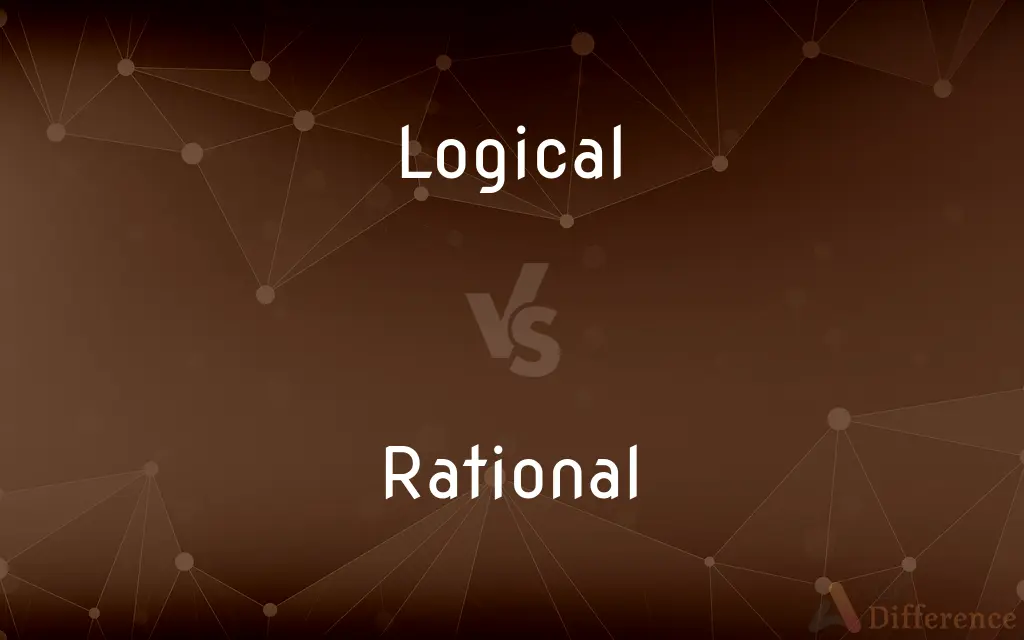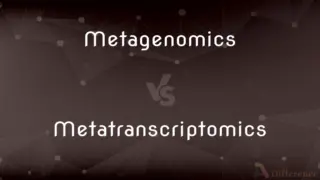Logical vs. Rational — What's the Difference?
By Fiza Rafique & Urooj Arif — Updated on April 17, 2024
Logical thinking follows established rules and principles of reasoning, while rational thinking considers the context and overall usefulness, often including emotions and practicality.

Difference Between Logical and Rational
Table of Contents
ADVERTISEMENT
Key Differences
Logical thinking strictly adheres to formal rules of reasoning and is often associated with mathematical or structured problem solving. On the other hand, rational thinking takes a broader perspective, incorporating both logic and other factors like emotions, ethics, and practicality to make decisions.
Logical reasoning is objective, focusing on the correctness of arguments regardless of their real-world application, whereas rational thinking evaluates the outcomes and their alignment with goals or values.
Logical processes are primarily concerned with the form of arguments, ensuring they are valid and sound based on premises, while rational thought is more concerned with the effectiveness and appropriateness of decisions in specific situations.
Logical thought does not necessarily account for human behavior or subjective experience, whereas rational thought often involves considering these elements to achieve the most beneficial outcomes.
Comparison Chart
Definition
Adherence to formal rules of reasoning.
Consideration of context and practicality in decision-making.
ADVERTISEMENT
Focus
Structural correctness of arguments.
Suitability and effectiveness of decisions.
Basis
Formal rules and principles.
Practical outcomes and context.
Application
Often theoretical or abstract.
Typically practical and situational.
Consideration of Emotions
Generally excluded.
Often included as part of decision-making.
Compare with Definitions
Logical
Adhering to the principles of formal logic.
She used logical reasoning to solve the complex puzzle.
Rational
Considering all relevant factors, including emotional and ethical dimensions.
His decision was rational, balancing personal values with practical outcomes.
Logical
Involving clear, reasoned thinking.
His argument was logical but lacked emotional insight.
Rational
Aligning actions with overall goals or benefits.
It was rational for the company to streamline operations to save costs.
Logical
Following a sequence that is consistent and non-contradictory.
The debate was structured in a highly logical manner.
Rational
Making decisions based on reason and practicality.
Her choice to invest was rational, considering her financial goals.
Logical
Emphasizing correctness and validity.
His conclusions were logical, derived from accepted axioms.
Rational
Applying sound judgment in real-world applications.
Choosing a job close to home was a rational decision for work-life balance.
Logical
Based on deductive reasoning.
The scientist used logical methods to test the hypothesis.
Rational
Reflecting adaptability in decision-making.
She made a rational choice to switch strategies based on market changes.
Logical
Of, relating to, in accordance with, or of the nature of logic
Logical disputation.
Rational
Having or exercising the ability to reason.
Logical
Based on earlier or otherwise known statements, events, or conditions; reasonable
Rain was a logical expectation, given the time of year.
Rational
Consistent with or based on reason or good judgment; logical or sensible
Rational decisions.
Logical
Reasoning or capable of reasoning in a clear and consistent manner
A very logical person.
Rational
Of sound mind; sane
Wondered if the eccentric neighbor was not completely rational.
Logical
(not comparable) In agreement with the principles of logic.
Rational
(Mathematics) Capable of being expressed as a quotient of integers.
Logical
Reasonable.
Rational
A rational number.
Logical
(not comparable) Of or pertaining to logic.
It's not logical, it's God!
Rational
Capable of reasoning.
Man is a rational creature.
Logical
(computing) Relating to the conceptual model of a system rather than its physical expression
Logical memory appears contiguous to an application program, but may well be stored on several physical devices, including in RAM and on hard-disks, as determined by the operating system.
Rational
Logically sound; not self-contradictory or otherwise absurd.
His statements were quite rational.
Logical
Of or pertaining to logic; used in logic; as, logical subtilties.
Rational
(of a person or personal characteristics) Healthy or balanced intellectually; exhibiting reasonableness.
Rational conduct
Logical
According to the rules of logic; as, a logical argument or inference; the reasoning is logical; a logical argument; a logical impossibility.
Rational
Of a number, capable of being expressed as the ratio of two integers.
¾ is a rational number, but √2 is an irrational number.
Logical
Skilled in logic; versed in the art of thinking and reasoning; as, he is a logical thinker.
Rational
Of an algebraic expression, capable of being expressed as the ratio of two polynomials.
Logical
Capable of or reflecting the capability for correct and valid reasoning;
A logical mind
Rational
(chemistry) Expressing the type, structure, relations, and reactions of a compound; graphic; said of formulae.
Logical
In accordance with reason or logic;
A logical conclusion
Rational
(physics) Expressing a physical object.
A rational table is physical, a written table is neither.
Logical
Marked by an orderly, logical, and aesthetically consistent relation of parts;
A logical argument
The orderly presentation
Rational
(mathematics) A rational number: a number that can be expressed as the quotient of two integers.
The quotient of two rationals is again a rational.
Logical
Based on known statements or events or conditions;
Rain was a logical expectation, given the time of year
Rational
(historical) The breastplate worn by Israelite high priests.
Logical
Capable of thinking and expressing yourself in a clear and consistent manner;
A lucid thinker
She was more coherent than she had been just after the accident
Rational
Relating to the reason; not physical; mental.
Moral philosophy was his chiefest end; for the rational, the natural, and mathematics . . . were but simple pastimes in comparison of the other.
Rational
Having reason, or the faculty of reasoning; endowed with reason or understanding; reasoning.
It is our glory and happiness to have a rational nature.
Rational
Agreeable to reason; not absurd, preposterous, extravagant, foolish, fanciful, or the like; wise; judicious; as, rational conduct; a rational man.
Rational
Expressing the type, structure, relations, and reactions of a compound; graphic; - said of formulæ. See under Formula.
What higher in her society thou find'stAttractive, human, rational, love still.
A law may be reasonable in itself, although a man does not allow it, or does not know the reason of the lawgivers.
Rational
A rational being.
Rational
Consistent with or based on or using reason;
Rational behavior
A process of rational inference
Rational thought
Rational
Of or associated with or requiring the use of the mind;
Intellectual problems
The triumph of the rational over the animal side of man
Rational
Capable of being expressed as a quotient of integers;
Rational numbers
Rational
Having its source in or being guided by the intellect (distinguished from experience or emotion);
A rational analysis
Common Curiosities
How do logic and rationality apply in everyday decision-making?
Logic is used to ensure reasoning is correct, while rationality ensures decisions are practical and contextually appropriate.
Can a decision be logical but not rational?
Yes, a decision can be logically correct but not rational if it doesn't consider practical outcomes or context.
Why is it important to be both logical and rational?
Being both helps ensure that decisions are not only correct in theory but also effective and appropriate in practice.
Is rational thinking always logical?
Rational thinking often includes logical reasoning, but it also considers other factors that logic might exclude, such as emotions or ethical considerations.
What are examples of logical fallacies?
Examples include ad hominem attacks or straw man arguments, which may seem logical but fail under scrutiny.
Can rational decisions vary from person to person?
Yes, as individual goals, experiences, and values can affect what is considered rational.
What is the main difference between logical and rational thinking?
Logical thinking focuses on following formal reasoning rules, while rational thinking considers practicality and context in decision-making.
What skills are important for rational thinking?
It involves critical thinking, situational analysis, and a balanced consideration of emotional and logical factors.
How can one improve their logical thinking skills?
Practicing puzzles, studying logic, and engaging in structured debates can help.
How does emotion play a role in rational thinking?
Emotions can provide important context and values that guide rational decision-making.
How do cultural factors influence rational thinking?
Cultural background can shape what is considered rational by influencing values and priorities.
What skills are important for logical thinking?
Skills such as identifying premises and conclusions, recognizing patterns, and understanding logical relationships are crucial.
Share Your Discovery

Previous Comparison
Metagenomics vs. Metatranscriptomics
Next Comparison
Hurlbat vs. WhirlbatAuthor Spotlight
Written by
Fiza RafiqueFiza Rafique is a skilled content writer at AskDifference.com, where she meticulously refines and enhances written pieces. Drawing from her vast editorial expertise, Fiza ensures clarity, accuracy, and precision in every article. Passionate about language, she continually seeks to elevate the quality of content for readers worldwide.
Co-written by
Urooj ArifUrooj is a skilled content writer at Ask Difference, known for her exceptional ability to simplify complex topics into engaging and informative content. With a passion for research and a flair for clear, concise writing, she consistently delivers articles that resonate with our diverse audience.















































